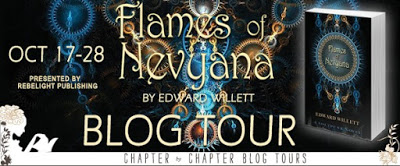From the ongoing blog tour for Flames of Nevyana, here’s today’s guest post from Lisa’s Loves (Books of Course):
The world of Flames of Nevyana began with a simple kernel of an idea: the magic of electricity.
I was driving from my home town of Regina, Saskatchewan, to Meadow Lake (about 500 kilometres north) for a library reading/presentation, and passing the time by trying to come up with a new YA novel idea. I got to musing on what is known in science fiction circles as Clarke’s Law: Arthur C. Clarke’s famous dictum that “Any sufficiently advanced technology is indistinguishable from magic.” I reflected on the fact that what we accomplish with electricity would certainly have seemed like magic to our distant ancestors. From there it was a hop, skip and jump (and another couple of hundred kilometres of driving) to the world of Nevyana, a land of magic—but one where the magic, known as Blue Fire, is essentially electricity, albeit produced and controlled through magical means.
My process of world building is a bit like an oyster crafting a pearl. There’s the initial idea—the grain of sand that irritates said oyster—and then the gradual building up of layer upon layer around that initial irritant/idea. For me, the process takes the form of a series of questions. The first question: how did the people of this otherwise medieval society learn to harness Blue Fire?
I decided that the magic had been bestowed upon them by their gods. Thinking of gods led me to think of how, in Earth mythology, there are often gods of specific aspects of nature: a God of the Earth, a God of Lightning, a Goddess of Wisdom, etc. I ended up with three gods, survivors of a war among the gods that devastated the original home of the people of Nevyana and drove them to a secluded valley, where they have built a new kingdom over the ensuing centuries. I made the three surviving gods the gods of Earth (Vekrin), Sun (Arrica), and Moon (Ell). Then I began thinking about how each of those different gods might approach benefiting their followers.
Vekrin, being of the Earth, would naturally want his people planted and stationary, so I decided he gave his followers access to Blue Fire through the Godstones, massive sources of power (generators, in other words) that cannot be moved and around which the twelve Cities of Nevyana naturally accreted. Arrica, being of the Sun, would naturally want her people to move across the face of the land as does the Sun. As a result, her followers, the Free Folk, obtain Blue Fire through Sunscales—magical versions of solar panels—which collect energy from the Sun during the day and store it for use at night. And Ell, being of the Moon, the ever-changing Moon, chose to change her followers, turning them from ordinary humans into furred, fanged-and-clawed, near-feline Nightdwellers, who cannot bear the light of day, and whose own measure of magic is focused on hunting and hiding.
With those basic ideas in place, the world of Nevyana took shape: a world in which Citydwellers hide inside walls, clustered around the Twelve Godstones strung the length of the Kingdom; the Freefolk of Arrica travel freely through the wilderness, using the Blue Fire they draw from the sun during the day to power a protective, glowing-blue Fence at night; and the Nightdwellers, long alienated from the others, who seek out and kill any followers of Vekrin or Arrica they find in their forests at night. My main characters are three teenagers, each a member of one of these three groups: Petra, a Priest-Apprentice of Vekrin, Amlinn, granddaughter of a leader of one of the Freefolk clans, and Jin, an apprentice Scrollkeeper of the Nightdwellers. They all have reason to mistrust or even hate each other (among other things, Nightdwellers killed Amlinn’s parents when she was a toddler), but they must work together to save their Kingdom when the sacred secrets of Blue Fire are stolen by a renegade priest and a scheming prince and turned toward conquest.
It’s a complex world that all began with a single thought on a long autumn drive northward, and I’m rather astonished myself how much came of that first inkling of an idea. But that’s what makes writing so exciting, for both authors and (I hope) readers.








